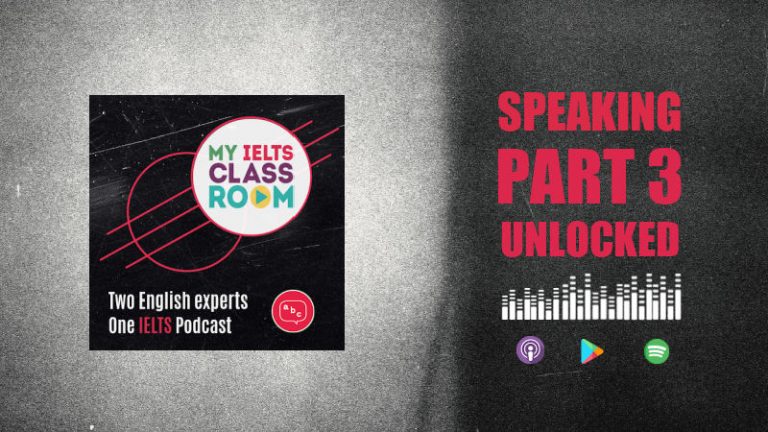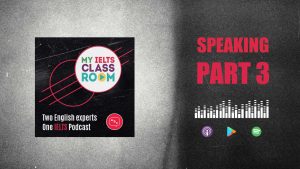
Unlock IELTS Speaking Part 3 Questions!
Part 3 is definitely the most difficult part of the IELTS speaking exam. This is where the questions move from asking about you, to asking about the world around you, and for many students, it can be hard to come up with ideas for these more abstract questions. Today, Nick and I discuss how to unlock IELTS Speaking Part 3 questions by finding the “hidden topic” inside them.
Plus, we are giving you the chance to record your own responses to five IELTS Speaking Part 3 questions and send them to us for feedback on next week’s episode.
Just record your answers to the following questions on your phone or computer, and email them to us at hello@myieltsclassroom.com before March 12th. Remember, your recording should be no more than about 4 minutes!
- Why are people more likely to expect things instantly now than in the past?
- Do you think society today is more strongly influenced by young people or old people?
- Is communication technology creating more information than people can deal with?
- How can recordings of people’s personal memories deepen our understanding of historical events?
- Why do you think so many extreme sports have been invented in recent years?
Below, you can find a summary of the episode, which includes links to useful materials 🚀
- Subscribe to My IELTS Classroom podcast on Apple podcasts here
- Subscribe to My IELTS Classroom on Google podcasts here
A brief introduction to IELTS Speaking Part 3
Nick and I have already recorded an episode that goes through the basics of IELTS Speaking Part 3, which includes are general advice about how to approach these questions. If you haven’t listened to that lesson yet, you may want to complete it first before you continue with this one by clicking here.

However, let’s go through some of the most basic facts about IELTS Speaking Part 3 now as a very quick introduction to any new to IELTS.
- Speaking Part 3 will last between 4 and 5 minutes and is an active discussion, which means that the examiner is free to ask follow up questions to your answers and interrupt you if they want to take the conversation in a different direction.
- You will be asked questions based on the same topic as your cue card.
- The questions will be ABSTRACT i.e., not about YOU but the world in general. Do not give personal examples or talk about your own life experience. The examiner will interrupt you if you do this.
- The questions are designed to make you demonstrate a range of functions. You might be asked to:
- agree or disagreewith a statement,
- compare two items
- give a reason or explanation for a current phenomenon
- evaluate or assessthe importance of an action;
- identify or describea trend;
- predict or speculateabout future habits;
- suggest a solutionto a problem
- The questions are divided into three sets. The examiner will choose two sets of sets for you. If he or she thinks that you are going to score a 7.0 or above, they will end the exam with the most challenging set of questions.
Win a Free 31 Day Subscription to My IELTS Classroom!
Take part in our competition to win a free One Month Subscription to all the My IELTS Classroom videos and live lessons, plus a free piece of marking by leaving a comment on one of our YouTube videos that includes the word “podcast” here .
The competition will run until we hit our target of 4,000 watch hours for the year. We are currently standing at about 3800, so watch a few videos and leave your comments soon to be in with a chance of winning this great prize!
How to unlock IELTS Speaking Part 3 Questions!
In our original episode, Nick and I also offer techniques that you can use to help you answer the tricky questions in Part 3. These included buying time to think, avoiding stereotypes, giving your answer before you are 100% sure what it is, and targeting the question.
However, while teaching last week, I realised that even when students are using these techniques, they still struggle to come up with ideas for many of the Part 3 questions. Sometimes this is because they do not have an adequate understanding of the topic – obviously it is impossible to answer questions about marketing or leadership or attitudes to learning if you have never considered these topics before.
But that is not the problem that I saw. What I realised is that when I hear many of the Part 3 questions, I immediately understand the topic or the theme that IELTS is trying to target in the question, but most of my students do not. Take this question for example:
Some people believe that in the future most people will live in apartment blocks. Do you think this is true?
What do you think the IELTS question writers were trying to make you talk about when they set this question? The obvious answer is “apartment blocks”, but I don’t think that is the case.
I think that they were hoping that the student would talk about population growth, movement to cities, and lack of space.
Do you see? None of these topics are directly mentioned in the question, but I think that this is really what the question is aimed at eliciting from the student.
And I think that this “hidden theme” is a real problem. Once I tell the student the topic or theme, they are able to give an extended, well-developed response. However, I am not going to be there in the exam to interpret the question for my students, so I want to look today at how you can start to recognise those main topics yourself.
Now, just to be clear, there are no “correct” responses in Part 3, so if your ideas are different to mine and you are able to extend and justify them, that is great. All I want to show you is how you can start to think about the response that questions were most likely constructed to generate.
And that is what Nick and I do for the rest of the episode. We will show you how to consider current trends, use examples, and consider the previous questions in the section to help you unlock IELTS Speaking Part 3 questions.
Then, we will give you the chance to consider the following ten questions to put these new techniques into practice. Why not try to think about your answers to the questions now before you listen to the episode, and then again once the episode ends. Are your responses the same or different?
- What do you think the role of professional news reporters will be in the future?
- Is it important to keep archaeological discoveries near where they were found?
- How is it possible that some people don’t notice time passing?
- Do you think it is right to spend money and time on research that has no immediate practical application?
- How do changes in people’s work and personal lives help them to learn new skills?
- To what extent should governments make laws to protect people’s health?
- Are cities that are very carefully planned boring?
- Is it acceptable for leaders to make decisions that could disadvantage people?
- Were people more inventive in the past?
- Why are some people more often dissatisfied with customer service than others?
